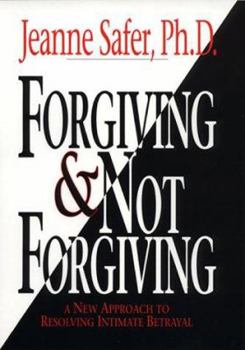Forgiving & Not Forgiving: A New Approach to Resolving Intimate Betrayal
Select Format
Select Condition 
Book Overview
In our culture the belief that "To err is human, to forgive divine," is so prevalent that few of us question its wisdom. But do we ever completely forgive those who have betrayed us? Aren't some... This description may be from another edition of this product.
Format:Hardcover
Language:English
ISBN:0380975793
ISBN13:9780380975792
Release Date:January 1999
Publisher:Avon Books
Length:210 Pages
Weight:0.90 lbs.
Dimensions:0.8" x 6.0" x 8.6"
Customer Reviews
4 ratings
Finally we don't have to forgive and ITS HEALTHY
Published by Thriftbooks.com User , 18 years ago
After years of hurt from a family member I decided I has enough. The rest of my family told me "to get over it". They were sending me articles that I was only hurting myself by being angry and I should forgive and forget. This book was a validation of my feelings that you can sometimes go to far. It really has helped me. I will read this again in another year or two and maybe get more out of it.
Can Not Forgiving be Right?
Published by Thriftbooks.com User , 20 years ago
This is the book that helped me more than anything else when I was struggling with whether or not I could forgive my mother for her anger, self-absorption, and need to control. At a time when clergy, therapists, and the lay community are urging forgiveness as an all-purpose cure for every troubled relationship, Safer counsels caution. Not forgiving can be as moral and healing in some situations as forgiving can be in others, she says.Safer is certainly not against genuine forgiveness, nor does she approve of vengefulness. Her concern is that people are rushed into a dishonest façade of forgiveness when they do not truly feel it. True forgiveness, she believes, takes time and is only partially under your conscious control. She also believes that not forgiving, when an action genuinely offends your moral sense, and the perpetrator has shown no remorse nor made any effort to change, is a an honest and moral choice.What is most important to Safer, and she illustrates it with many examples, is a serious attempt to engage with your feelings about the relationship in question and to admit the ways in which you may have contributed to it. Only such honesty can lead to a healthy outcome, but what a healthy outcome is differs for each person and situation. She also stresses that forgiveness and non-forgiveness are not opposites; they are points along a continuum, and there are many points in between. Each individual must decide what is right for him or her, and any counselor who urges a particular and predetermined result does the client a disservice.I recommend this book (which is clearly and interestingly written) to anyone who is struggling with forgiveness, or simply interested in it. Lynda Goin (David B. Richman's wife)
What is forgiveness and is it mandatory?
Published by Thriftbooks.com User , 24 years ago
12 Step programs stress the necessity of making amends to all who have been harmed. Most of the practicioners of 12 Steps confuse amends -- repairing an injury -- with seeking forgiveness from the injured party -- "I've said I'm sorry, and now you have to forgive me!" The literature surrounding these 12 Step programs also tends to make the transgressor the injured party, by having the victim concentrate on what was his or her contribution to the injury, and then requiring the injured party to seek forgiveness from the transgressor, ignoring the injuries caused by the injuring party.Safer cuts through this nonsense with a scapel, and reassures the injured parties that it may be necessary to withhold forgiveness in order for the intimate betrayal to heal. She skewers those who would offer "helpful advice" which consists of "forgive and forget" and its lemma, "Get on with your life."Unfortunately, she relies upon a retrograde Catholic Priest, a former Lutheran minister, Richard Neuhaus, who gives his own warped interpretation of what the Christian doctrine of forgiveness is all about. Neuhaus says that anything less than absolute forgiveness is worthy of damnation. He has yet to forgive any of those who critique his own rigid theological inerrancies. Neuhaus states "It is morally imperative to forgive in all circumstances." Res ipsa loquitur.Fortuunately, she is able to demolish this demonical straw boss of a Neuhaus, and the remainder of the book sings with joy, hope and freedom. True forgiveness looks at the betrayal, candidly weighs what is necessary to make the injured party whole, and acts accordingly. False forgiveness, doubles the injury without the necessary healing. Advising an other to forgive in order to relieve one's own conscience is the true evil, and for this Neuhaus is justly condemned. If I have not been injured, then how can I order an other to forgive? Total and unconditional forgiveness of an intimate betrayal does not come easy. When it is possible, the rewards are plentiful. Been there, done that! But a forgiveness that is incomplete beats hatred of self, and revenge towards others. And few have the fortitude of Job. And those of us that are yet unable to completely, totally, and without reservation, forgive the betrayer, may not be saints, but we are not the sinner who betrayed us. Safer's life journey is not complete, yet she offers us a ride as she moves to a better place.
Smart, honest guide to dealing with betrayal.
Published by Thriftbooks.com User , 24 years ago
Safer gives an adult view of how to deal with friends and family members who do us wrong. It's adult because she doesn't leap to the conclusion that we must forgive everyone for every thing. Besides theory, she gives fifty stories of betrayal, many of them wrenching. My favorite: the jailed contract killer who had to forgive himself. No psychobabble, no preaching, no quick twelve-step fixes.




